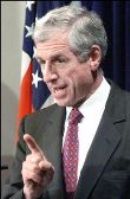US mulls stopping aid if no peace deal in South Sudan
By Evelyn Leopold
UNITED NATIONS, Nov 9 (Reuters) – The United States next week intends to tell Sudan and its southern opposition that offers of aid may be withdrawn if an agreement is not signed soon to end Africa’s longest-running civil war, its U.N. ambassador said.
 The U.N. Security Council is conducting a rare formal session in Nairobi Nov. 18-19 to pressure all parties to sign an agreement in the south by the end of the year and solve the crisis in Darfur in western Sudan.
The U.N. Security Council is conducting a rare formal session in Nairobi Nov. 18-19 to pressure all parties to sign an agreement in the south by the end of the year and solve the crisis in Darfur in western Sudan.
Although headlines have focused on Darfur, council members are worried that preliminary agreements in the south may unravel. The United States and the European Union have put on hold promises of funds for all sides until a pact is signed.
A draft resolution to be adopted in Nairobi “encourages” the World Bank and others to develop a reconstruction and economic development package, including debt forgiveness, once an agreement is reached in the south.
U.S. Ambassador John Danforth, the current council president and organizer of the trip, went further and said some offers would not last forever.
“We have been waiting for action by the government of Sudan and by the (southern) Sudan Peoples Liberation Movement (SPLM) for a very long period of time,” he said recently.
“But it would be presumptuous to say, and I think it would be wrong to think, that any offer that’s put on the table by the international community will be there for long,” Danforth said.
The U.N. mission, including Secretary-General Kofi Annan, will meet privately with with Sudanese ministers, rebel leaders and African officials.
SOUTHERN DEAL COULD BE DARFUR MODEL
Six protocols have already been signed between Khartoum and the SPLM, but are not in force. They include agreements on governmental power sharing, the country’s oil wealth as well as integrated security forces in southern Sudan, the Nuba Mountains, the Southern Blue Nile and Khartoum.
In six years, southerners would be entitled to a referendum to determine whether they wanted to form their own state.
The U.N. envoy to Sudan, Jan Pronk, told the council that the southern deal, involving a new constitution, a federal structure for Sudan, could serve as a model for Darfur.
He said the main obstacle was the financing of an army in the south and the “parties seem reluctant to move.”
“Strong political language is needed. They will listen to it if the big powers say it,” Pronk said, referring to the United States, Russia, China, Britain and France.
In the past 21 years, 2 million people, mostly civilians, have died from violence in the south as well as disease and famine in a country rich in oil.
The rebellion in the south was aimed at the Khartoum government dominated by Arab Muslims. The Sudan People’s Liberation Movement is composed mainly of African animists and Christians, but throughout the country there are hundreds of ethnic, tribal divisions and language groups.
In Darfur, where there is no religious division, African rebels protested against government rule and started an armed revolt nearly 18 months ago. The Sudanese government called on Arab tribesmen to launch raids, which resulted in rape, killings and uprooting of more than 1 million civilians.
In recent weeks, Pronk has questioned how much control the government has over the Darfur militia. He also said Darfur rebels, aligned with those in the south, were provoking the Arab tribesmen in hopes foreign troops would intervene and they will have posts in a government.
Danforth acknowledged “no side has clean hands,” but he said, “I don’t think that any modicum of blame should be in anyway reduced from the government of Sudan.”
